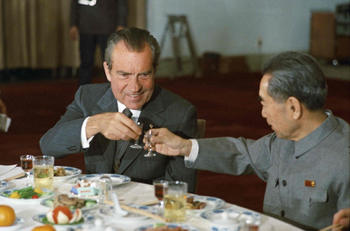China’s anti-corruption may have caused a Chinese state-owned company to buy real estate overseas recently, but not for the usual reasons associated with capital flight.
China’s luxury liquor-maker, Kweichou Moutai, which produces the hard-edged baijiu favored by government officials last week announced that it will invest $11.76 million to buy real estate in Paris to open new distribution outlets for its incendiary distillate.
Moutai as the Currency of Corruption
Moves by China’s new government may be at least partly the cause of the liquor company’s overseas migration.
Moutai’s premium but high proof spirit can cost $300 for a top-shelf bottle, which combined with the drink’s assocation with government banquets has caused the company’s sales to drop by as much as 30 percent this year.
Because of its high price, Moutai is China’s common currency for bribes and gave birth to the local saying that, “Those who buy Moutai never drink it, while those who drink it never buy it.” With that kind of reputation, it may be that both “flies and tigers” have put off their taste for the extravagant spirit until things cool down a bit.
Moving Overseas to Hedge Risk Or Grow Sales
While many analysts interpret the overseas acquisitions of real estate giants such as Greenland Group or Dalian Wanda, as ways for the companies to move some of their assets beyond the reach of government regulators, Moutai apparently sees its French investment as a way to meet demand for the fire-water brand favored by Mao Zedong among Chinese residents of Paris.
Moutai was named the 46th most innovative company in the world by Forbes earlier this year, and Yang Qingshan, executive president of the China Brand Strategy Association told the local press last week that the overseas real estate acquisition was part of Moutai’s globalization strategy.
The company’s chairman, Yuan Renguo had declared in 2011 that it would grow its international business and by building five overseas branches in five years.
Does Moutai Have a Chance in the World’s Wine Capital?
Whether Moutai can make a profit from selling its product overseas remains to be seen, and France may appear to be an unusual choice for the company’s first overseas branch. Even as a premium baijiu, the liquor – which ranges from 75 to 100 proof – has often been compared to anti-freeze, and French buyers are known for their partiality to their own tasty grape-based beverages.
Still, if Moutai does make it in Paris then they may be able to improve their ranking that innovation list.

Leave a Reply